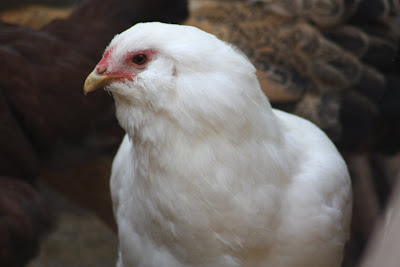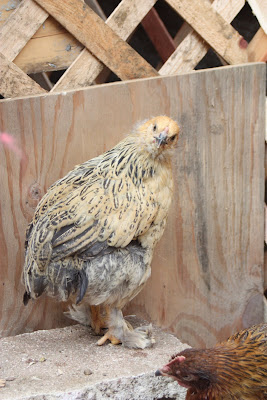Sounds like an awesomely bad B movie, eh? Well if you want to see it, there's a showing going on in my backyard. Yes, dear readers, we lost two more feathered friends, Violet and Petunia. I've only got a couple ladies left and these days I often find them huddled together looking tense, as if the Grim Reaper were hot on their heels. I hate to tell them, I think he is.
Petunia inconveniently kicked the bucket the morning of my daughter's 6
th birthday. Ute's present this year? A good lesson in the hard knocks of life. Before rushing off to school, she held a dying chicken in her arms, hopefully giving that bird a comforting send off towards the great hen house in the sky. Raising peeps was supposed to teach my child about the cycles of life. Instead she is getting a crash course in all things death. I am unnerved by the fact that Ute no longer associates chickens with laying eggs, but with looking cute for a while and then suddenly dropping dead. And why wouldn't she? Christ, this season's tomato plants have lasted longer than the damn hens!
Violet hadn't been acting like herself for several days before her death. Nothing too alarming. She just tended to be off by herself, separating from the rest of the flock. And when I would pet her, she would crouch down rather than pushing back up against my hand, which was her usual m.o. I had read that this was a sign that the hen was about to start laying and since the ladies were approaching that time, I didn't think too much of it. Then last Thursday morning I found her sprawled out underneath the feeder. I shrieked at the sight (I am not ashamed to be a shrieker). To add to the gruesomeness of the scene, I saw that she was still alive, gasping for air and unable to lift her head or move her legs. I cradled her in my arms and stroked her until she left this world.
I knew Petunia wouldn't make it more than a day longer than Violet. She had also been acting a little depressed and was no longer living up to her nickname, "the Asshole". In the evening when I was putting the ladies to bed, I was heartened when she executed an amazing 180 on the roosting bar so that she could snack from the feeder without losing her spot. I stretched my hand out to pet my girls before I closed up the coop and Petunia whipped out her wings, sheltering Sweet Pea and Gertrude on either side of her like a good mother hen. And to let me know who was boss, she gave me a peck on the hand. I was thrilled to see her back to her old tricks. But the next morning, I found her prostrate on the floor of the coop, having fallen off the roosting bar, in the same position as Violet with the same symptoms. However, death was not so swift for her. She held on for a solid half hour and when I tried to lay her down so that I could get Ute ready for school, she freaked,
squawking as hard as she could muster and moving any body part that wasn't paralyzed. I couldn't let her die in such a state. So I swaddled her in a tea towel, carrying her upstairs like a baby. And that is how my daughter came to hold a dying chicken on her birthday. We used it as a teaching moment, discussing how it was a precious thing to be able to give someone we care for a loving departure. [What? It's not my fault the bird decided to make her exit on this day. I'll put an extra $75 in the therapy jar. It'll pay for at least a half of a session. Happy now?]
Discouraged. Dismayed. Demoralized. Disheartened. Dispirited. Distressed. Why do all of my feelings start with the letter "D". I digress. I imagine that many of you out there might be thinking, "Wow, chickens must be extremely fragile creatures!", or maybe "Heidi doesn't know enough about poultry to pull this off.", or even "See I told you raising chickens in the city is a bad idea." I don't blame you. It's not like I haven't thought these things myself. But I don't think any of them are necessarily true. Chickens are super easy to care for: food, water, predator proof housing, roosting bar, laying box... done! The tricky parts? Predators and disease. There are over 200 poultry diseases and a few of them are some mean ass, fucked up sicknesses (pardon my french). And if you buy your birds from a sketchy breeder, you're certain to have a few nasty illnesses smuggling themselves inside those cute puffs of fluff.
I'm pretty sure my birds died of
Marek's, which I have astutely assessed with that online Vet degree I've been working towards. In vaccinated birds, deaths due to
Marek's shouldn't surpass 5% and in
unvaccinated flocks you might be looking at 60%. According to the breeder whom I purchased the chicks from, all of the birds were vaccinated. I don't know if I'm buying that. I'm probably going to be looking at 80-100% mortality. Gertrude is not growing, though she eats like a pig. And both birds are dropping feathers. That's been the first sign with this bug. I can't know for sure unless I get a necropsy, which would require driving to Davis, paying a fee for the services, and possibly culling one of the two remaining birds. That doesn't sound appealing to me. My killing days are done for now.
Maybe the birds were vaccinated and I'm just horribly unlucky. As my dad says, "Just because you're paranoid doesn't mean that the world isn't out to get you." He also warned me that I would need to learn a lot about poultry diseases BEFORE I got the chickens. He's probably sitting behind his computer right now doing an "I told you so!" dance. [You stop that right now dad! I know you're doing it. Not funny!]
I had several email exchanges with the breeder. She told me that she had autopsies on her birds last year and they found
Marek's and Cocci in her flock. She copped to both of those diseases when I picked up the second batch of birds, so I'm not going to hold that against her. I'll give her credit for trying to be helpful. But when she told me that she would be relocating her operation and alluded to the fact that it had to do with disease issues, I absolved myself of any potential wrongdoing in the raising of my ladies. She offered to replace my birds, which felt more like she was trying to unload the dead weight (pun intended) to avoid bringing it to a new location. I politely declined, but thought to myself "You couldn't pay me to take your chickens lady, no matter how pretty and tempting they are."
So what am I going to do now? Well I guess I'm going to let the girls live out their natural lives and simply wait for them to meet their maker. One of my fears is that only one will survive and then I will HAVE to introduce at least one new chicken (remember chickens are not loners) to the property. The 2 remaining birds are probably carriers of whatever they have so that means as long as they are around, there is still potential for more losses as they will infect any birds they are housed with. I suppose I will have to cross that bridge when I come to it. I don't think I can deal with one more dead animal. Mostly because I have run out of places to bury them.
Heidi's Hard Learned Top 5 Tips on Purchasing Chickens:
1. Purchase birds from a reputable breeder. Ask around. Don't go with any Tom, Dick, or Harry. Who knows what kind of nasties they have infesting their operation.
2. Buy vaccinated birds. It's not a 100% guarantee, but it could save you some heartache.
3. The bird should look healthy: bright eyes, plucky spirit, no drippy nose or eyes, have meat on its breast (the keel or breastbone should not stick out so much that it feels like a spatula), no pasted up vents, no signs of mites. Have a chicken owner friend come with you. They'll know what healthy looks like.
4. Know how to keep your birds healthy by having some general knowledge of common poultry issues: mites, illnesses, treating injuries, appropriate feed and supplements.
5. See #1.
R.I.P. Petunia and Violet. You were good, and very good looking, chickens.











































